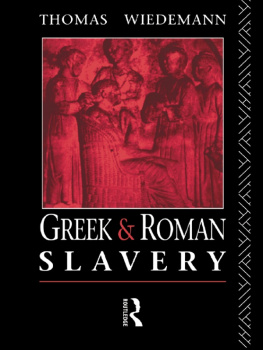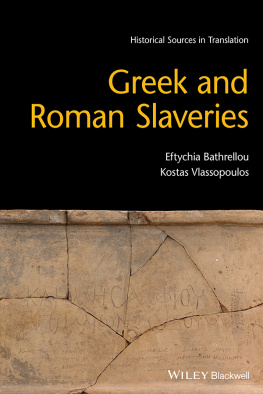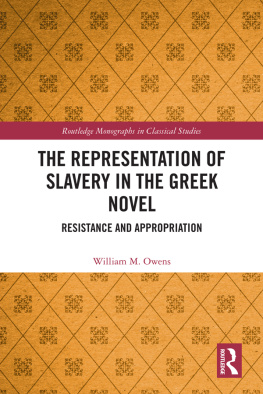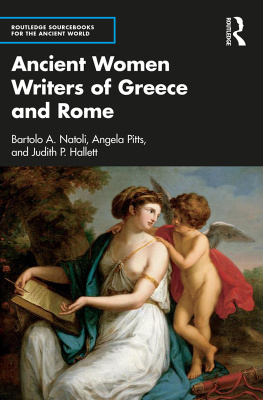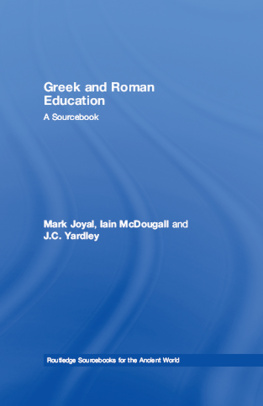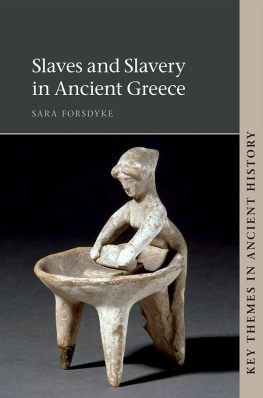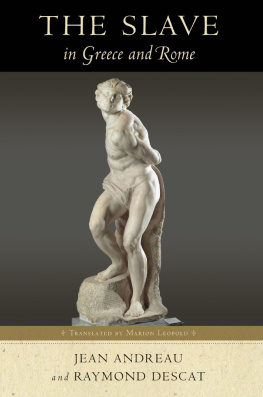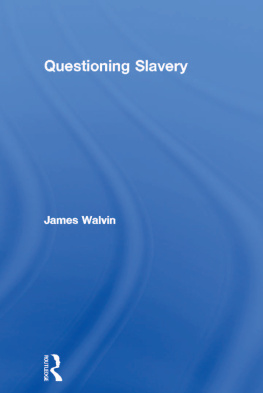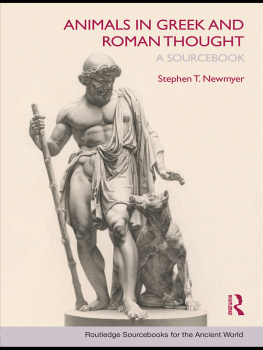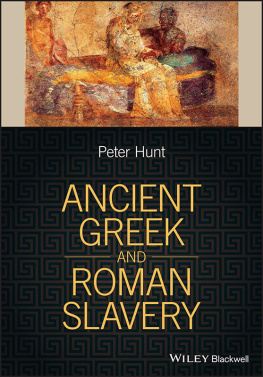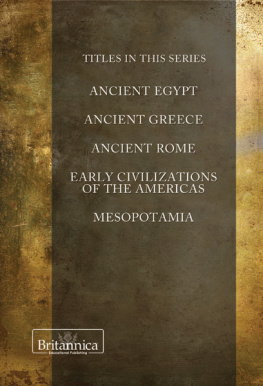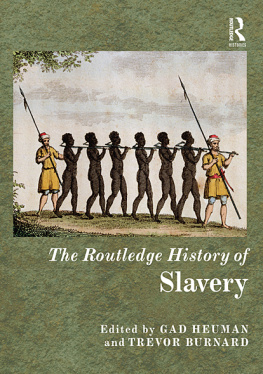GREEK AND ROMAN SLAVERY
THOMAS WIEDEMANN

London and New York
First published 1981 by Croom Helm Ltd
Routledge is an imprint of the Taylor & Francis Group
This edition published in the Taylor & Francis e-Library, 2005.
To purchase your own copy of this or any of Taylor & Francis or Routledges collection of thousands of eBooks please go to www.eBookstore.tandf.co.uk.
1981 Thomas Wiedemann
All rights reserved. No part of this book may be reprinted or reproduced or utilized in any form or by any electronic, mechanical, or other means, now known or hereafter invented, including photocopying and recording, or in any information storage or retrieval system, without permission in writing from the publishers.
British Library Cataloguing in Publication Data
A catalogue record for this book is available from the British Library
Library of Congress Cataloging in Publication Data
A catalog record for this book is available from the Library of Congress
ISBN 0-203-35899-6 Master e-book ISBN
ISBN 0-203-37575-0 (Adobe eReader Format)
ISBN 0-415-02972-4 (Print Edition)
PREFACE
In recent years, the study of slavery amongst the Greeks and Romans has increased considerably. Students, and their teachers, have become generally more interested in social and economic questions than in political and military history of the traditional kind. In North America, comparisons and contrasts between the roles and conditions of slaves in the ancient Mediterranean world and in the West Indies and United States have underlain many studies of ancient slavery since the nineteenth century. Another intellectual tradition going back to nineteenth-century presuppositions has also directed attention towards ancient slavery: Marxs analysis of slave-holding as one of the characteristic types of organising an economy (or, in the debased vulgar-Marxist form, one of the economic stages through which all human societies inevitably have to pass). Many of the studies on ancient slavery undertaken in Europe since the war have been initiated either by Marxist scholars, or in response to the questions posed by them. Scholars are agreed that many particular historical problems associated with slavery have yet to be solved before a comprehensive account of Greek and Roman slavery can be writtenand that such an analysis will effectively have to be an account of ancient social and economic patterns as a whole.
Simply because slavery was something which affected virtually every aspect of society, ancient references to it are unsystematic and occur in a wide range of sources of different kinds, epigraphical as well as literary. No selection of such sources has hitherto been published, even in the original languages; and it is not always easy for readers interested in social and economic history who do not know Latin and Greek to locate the texts and inscriptions to which books and articles about slavery appeal as their evidence. This selection is intended primarily to assist such readers. It is not intended as a substitute for a systematic treatment of the subjectsomething altogether more ambitiousand it is assumed that readers will be using it in combination with other books on the subject, or within the framework provided by a school or university course. Hence only a minimal attempt is made to introduce the reader to even the most basic theories about how ancient social and economic institutions functioned, or to explain different interpretations of why slavery was so widespread in Greece and Rome and what roles it performed. Some users would no doubt have preferred more detailed introductions to the passages selected; but on consideration it was thought better that a non-classicist reader should have to turn to a separate reference book (such as the Oxford Classical Dictionary) for explanations of names and events with which he might be unfamiliar, than that the amount of original material here presented should have had to be restricted yet more. The selection is limited enough as it is, and many readers will inevitably feel disappointed that some passages which they would consider crucial are omitted. Limitations of space have been keenly felt: perhaps epigraphical and papyrus evidence has suffered proportionately more than it should. But it is in the nature of a selection that a great deal of material has to be left out. References are made to parallel passages in Lewis and Reinholds useful source book, Roman Civilization, and in Austin and Vidal-Naquets stimulating Economic and Social History of Ancient Greece. Except where absolutely necessary, I have avoided duplicating material provided in these selections.
The omission of many illuminating passages from drama and poetry is less easy to defend. Rather than take passages out of their dramatic context (which would generally have required a detailed commentary), I have thought it better to omit such ambiguous material altogether; the hope is that when readers find a reference to such passages in any of the books or articles they are using, they will wish to look up the whole of the poem or play in question. This particularly applies to comedy, both Greek (especially Menander) and Roman (Plautus and Terence)full of allusions to the behaviour and treatment of slaves which can be considered only in their context. Homer, too, will be conspicuous by his absence; here the defence is that, however we understand the system of slavery in the Iliad and the Odyssey, this is not the chattel slavery of classical Athens. The assumption has been that most users will be interested primarily in slavery as it appears in the classical periods of fifth and fourth century Athens and of Rome in the first centuries BC and AD. As with other institutions, there were very different forms of slavery in other times and places in antiquity; and not just the Homeric period, but Graeco-Roman Egypt and the late Roman colonate are not dealt with here.
Of course even in the two classical periods there will have been major differences in the way slavery was practised in each particular Greek polis and Italian municipalityindeed, no doubt each individual household was unique. But a social institution like slavery does not consist merely of a series of individual cases occurring over historical time: it is a set of ideas in mens minds. The arrangement of material by themes is intended to bring out the ways in which Greeks and Romans had similar (and occasionally different) perceptions of what slavery meantmany of them naturally shared by other societies which practised slavery. It is hoped that readers who prefer historical narratives to be in chronological sequence, and believe that enough evidence exists for a diachronic picture of slavery in the ancient world, will nevertheless be able to make some use of this selection with the help of the indices.
A word of explanation may also be needed regarding the English transliteration of Greek personal names and place names. The problem is well known: in the English cultural tradition, ancient Greek names have been rendered in the form of transliterations made by the Romans. There seems to be no reason why these distortions have to be maintained in modern English after all, transliterations of contemporary Greek names are not made via Latin; and the French and German conventions for classical names are quite different. On the other hand, Latinised versions of Greek names have become so familiar that many of them are accepted as English: this is particularly so for place names. I have therefore refrained from spelling Socrates, Plato and Aristotle as Sokrates, Platon and Aristoteles, but have given most Greek names in a form approximating to the Greek alphabet. (Where names which are clearly Roman occur in a Greek literary text, I have generally given them in a Latinised form.) With place names I have been even less consistent; in order to avoid confusion, all but the least significant places are given in the forms in which they are most frequently referred to in English (at least by historians); most of these are Latinised, and many are given in modern (French, Italian etc.) forms. The objective has been to preserve the flavour of the Greek, but not at the expense of confusing the reader.

